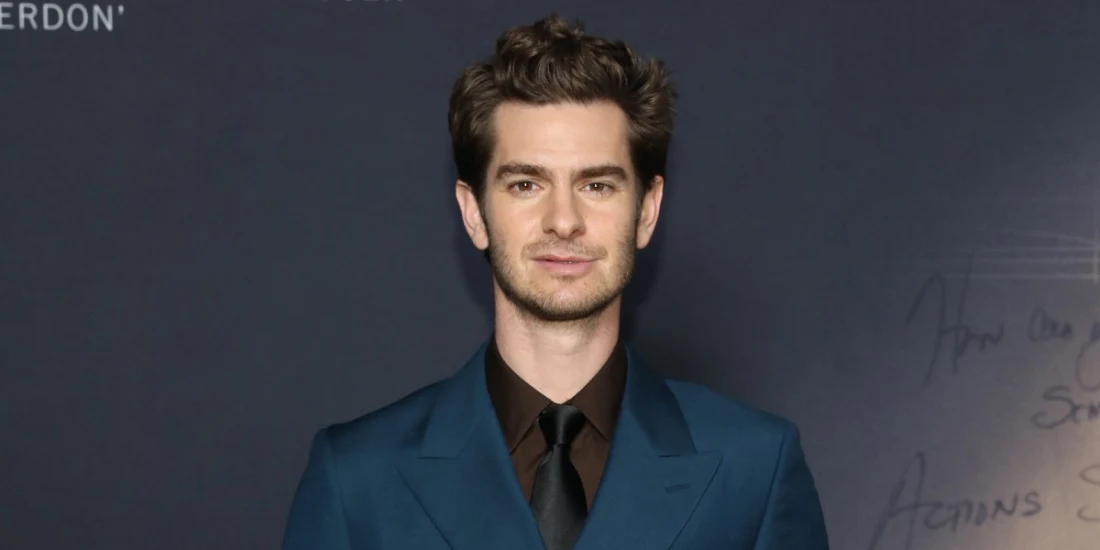How Andrew Garfield became Jonathan Larson for 'tick, tick... BOOM!'
Andrew Garfield's career has taken him from England to America and back, from the stage to the screen. He's earned a British Academy Television Award for his film work in Boy A, an Olivier Award nomination and a Tony Award win for starring as Prior Walter in Angels in America in the West End and on Broadway, and critical acclaim for films like The Amazing Spider-Man series and plays like Death of a Salesman. For all his range, the one thing Garfield hasn't done, professionally at least, is a musical.
Enter tick, tick... BOOM!, the Netflix film directed by Lin-Manuel Miranda. Based on the 1990 musical of the same name, the movie is a semi-autobiographical account of composer Jonathan Larson's life before he wrote his biggest hit: Rent. tick, tick... BOOM! sees Garfield playing a Larson that's collapsing under the fear of reaching his 30th birthday, which is days away, without a professional credit to his name. He alienates his friends as he sits at an old Mac computer without a clue what to write for the climactic song of Superbia, the sci-fi musical he'd written for eight years thinking it would be his magnum opus. Playing this Larson required Garfield to dig into the aspects of his life most of the world has never seen — all without Larson, who died in 1996 just before Rent premiered, to advise him. Not directly, at least.
Garfield spoke with New York Theatre Guide about his preparation process for tick, tick... BOOM!, which was one part research and one part letting go of the research to let Larson's presence, as Garfield put it, take over.
How familiar with Larson's work were you before you came onto tick, tick... BOOM!?
I really got a big education in Jon Larson when I took on the role. Lin introduced me to a long-lost brother that I didn't know I had, and that was Jon. I felt a real kinship immediately in my immersion into who he was and how he lived and the work that he left behind and the relationships that he left behind, the loved ones that he left behind. I had every single resource at my fingertips and that was a beautiful thing, to do a "university three-year course" in Jonathan Larson, so that when I got on set finally to play him — when I got onto the stage at New York Theatre Workshop or whatever we were shooting on whatever particular day — that I could really just get out of the way and let Jon move through me, because he was absolutely present for this process with us.
How was he present for you?
We were calling him in every day and asking him to guide us and be our North Star. And that was especially important for me because I just so wanted him to feel honored and proud and represented in a way that that he would be happy with. There was a mystical component with this process that I hadn't experienced previously, where it was a lot of me preparing to the nth degree and then really just clearing myself out of the way so that Jonathan could come through me and follow his impulses.
What kind of conscious preparation did you do to immerse yourself in Larson's life?
I did do a lot of physical research and diving into archives, watching him doing his one-man show Boho Days which was then turned into tick, tick... BOOM! and listening to his unreleased songs, looking at his own cassette and record collection, seeing the books that were on his shelves, speaking directly to his family members and his friends, and learning about what he was like at breakfast, lunch, and dinner and everything in between. Where he slept, how he slept, how many hours he slept a night.
Did you have to develop any new skills to play the role?
There's my own personal work, which is about interpreting and finding the essence of the character and finding those parts in myself, finding where we meet and finding where I had to stretch a bit more. There was the singing and the piano and the dancing, which were skills that I was so desirous to attain. So that was all the propeller fuel that I needed, combined with this deep longing I had to honor Jon and everything he stood for as an artist and as a man. And then it was just a year and a half of getting my voice and my piano playing to the degree where I could be passionate on stage and full of abandon, reckless abandon — a kind of punk rock, musical theatre expression, and feel like I was virtuosic, even though I didn't fully deeply believe it.
Photo credit: Getty for Netflix
Originally published on
